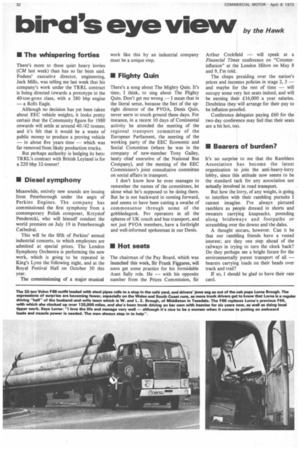bird's eye view by the Hawk
Page 34

If you've noticed an error in this article please click here to report it so we can fix it.
• The whispering forties
There's more to these quiet heavy lorries (CM last week) than has so far been said. Fodens' executive director, engineering, Jack Mills, was telling me last week that his company's work under the TRRL contract is being directed towards a prototype in the 40-ton-gross class, with a 280 bhp engine — a Rolls Eagle.
Although no decision has yet been taken about EEC vehicle weights, it looks pretty certain that the Community figure for 1980 onwards will settle at around 40/42 tonnes; and it's felt that it would be a waste of public money to produce a proving vehicle — in about five years time — which was far removed from likely production trucks.
But perhaps authority is hedging its bets: TRRL's contract with British Leyland is for a 220 bhp 32-tonnerT
• Diesel symphony
Meanwhile, entirely new sounds are issuing from Peterborough under the aegis of Perkins Engines. The company has commissioned the first symphony from a contemporary Polish composer, Krzystof Penderecki, who will himself conduct the world premiere on July 19 in Peterborough Cathedral.
This will be the fifth of Perkins' annual industrial concerts, to which employees are admitted at special prices. The London Symphony Orchestra is performing the new work, which is going to be repeated in King's Lynn the following night, and at the Royal Festival Hall on October 30 this year.
The commissioning of a major musical work like this by an industrial company must be a unique step.
• Flighty Quin
There's a song about The Mighty Quin. It's time, I think, to sing about The Flighty Quin. Don't get me wrong — I mean that in the literal sense, because the feet of the upright director of the PVOA, Denis Quin, never seem to touch ground these days. For instance, in a recent 10 days of Continental activity he attended the meeting of the regional transport committee of the European Parliament, the meeting of the working party of the EEC Economic and Social Committee (where he was in the company of new-member Tony Galley, lately chief executive of the National Bus Company), and the meeting of the EEC Commission's joint consultative committee on social affairs in transport.
I don't know how he even manages to remember the names of the committees, let alone what he's supposed to be doing there. But he is not backward in coming forward, and seems to have been cutting a swathe of commonsense through some of the gobbledegook. Psv operators in all the spheres of UK coach and bus transport, and not just PVOA members, have a forthright and well-informed spokesman in our Denis.
• Hot seats
The chairman of the Pay Board, which was launched this week, Sir Frank Figgures, will soon get some practice for his formidable Aunt Sally role. He — with his opposite number from the Prices Commission, Sir Arthur Cockfield — will speak at a Financial Times conference on "Counterinflation" at the London Hilton on May 8 and 9, I'm told.
The chaps presiding over the nation's prices and incomes policies in stage 2, 3 — and maybe for the rest of time — will occupy some very hot seats indeed, and will be earning their £16,131:10 a year salaries. Doubtless they will arrange for their pay to be inflation-proofed.
Conference delegates paying £60 for the two-day conference may feel that their seats are a bit hot, too.
• Bearers of burden?
It's no surprise to me that the Ramblers Association has become the latest organization to join the anti-heavy-lorry lobby, since this attitude now seems to be the standard tack for any association not actually involved in road transport.
But how the lorry, of any weight, is going to interfere with their rambling pursuits I cannot imagine. I've always pictured ramblers as people dressed in shorts and sweaters carrying knapsacks, pounding along bridleways and footpaths or scrambling over the downs and the dales.
A thought ()CCM, however. Can it be that our rambling friends have a vested interest; are they one step ahead of the railways in trying to turn the clock back? Do they perhaps see a bright future for the environmentally purest transport of all — bearers carrying loads on their heads over track and trail?
If so, 1 should be glad to have their rate card.












































































































